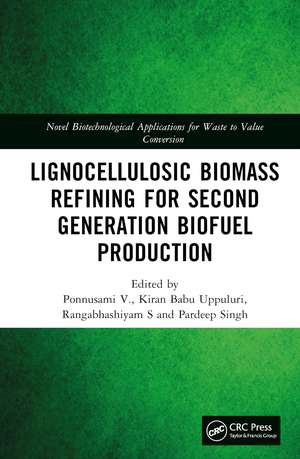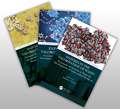Lignocellulosic Biomass Refining for Second Generation Biofuel Production: Novel Biotechnological Applications for Waste to Value Conversion
Editat de Ponnusami V., Kiran Babu Uppuluri, Rangabhashiyam S, Pardeep Singhen Limba Engleză Hardback – 14 iul 2023
Features:
- Describes technological advancements for bioethanol production from lignocellulosic waste
- Provides the roadmap for the production and utilization of 2G biofuels
- Introduces the strategic role of metabolic engineering in the development of 2G biofuels
- Discusses technological advancements, life cycle assessment, and prospects
- Explores the novel potential lignocellulosic biomass for 2G biofuels
| Toate formatele și edițiile | Preț | Express |
|---|---|---|
| Paperback (1) | 442.02 lei 6-8 săpt. | |
| Taylor & Francis Ltd. – 19 dec 2024 | 442.02 lei 6-8 săpt. | |
| Hardback (1) | 896.75 lei 6-8 săpt. | |
| CRC Press – 14 iul 2023 | 896.75 lei 6-8 săpt. |
Preț: 896.75 lei
Preț vechi: 1093.61 lei
-18% Nou
Puncte Express: 1345
Preț estimativ în valută:
171.59€ • 179.15$ • 142.01£
171.59€ • 179.15$ • 142.01£
Carte tipărită la comandă
Livrare economică 05-19 aprilie
Preluare comenzi: 021 569.72.76
Specificații
ISBN-13: 9781032067001
ISBN-10: 1032067004
Pagini: 306
Ilustrații: 20 Tables, black and white; 62 Line drawings, black and white; 5 Halftones, black and white; 67 Illustrations, black and white
Dimensiuni: 156 x 234 x 19 mm
Greutate: 0.61 kg
Ediția:1
Editura: CRC Press
Colecția CRC Press
Seria Novel Biotechnological Applications for Waste to Value Conversion
ISBN-10: 1032067004
Pagini: 306
Ilustrații: 20 Tables, black and white; 62 Line drawings, black and white; 5 Halftones, black and white; 67 Illustrations, black and white
Dimensiuni: 156 x 234 x 19 mm
Greutate: 0.61 kg
Ediția:1
Editura: CRC Press
Colecția CRC Press
Seria Novel Biotechnological Applications for Waste to Value Conversion
Public țintă
Professional ReferenceCuprins
1. Physical and Physicochemical Pretreatment Methods for Lignocellulosic Biomass Conversion 2. Biorefining Processes for Valorization of Lignocellulosic Biomass for Sustainable Production of Value-Added Products 3. Inhibitors and Microbial Tolerance during Fermentation of Biofuel Production 4. The Role of Metabolic Engineering in the Development of 2G Biofuels (Both in Conversion and Fermentation) 5. Fermentation of Hydrolysate Derived from Lignocellulose Biomass toward Biofuels Production 6. Rector Configurations for Thermochemical Conversion of Lignocellulosic Biomass 7. Advanced Pretreatment Process for Lignocellulosic Biomass 8. Ionic Liquids as Solvents for Separation of Biobutanol 9. Intensification in Bioethanol Production and Separation 10. Pervaporation as a Promising Approach for Recovery of Bioethanol 11. Production of High-Performance/Aviation Fuels from Lignocellulosic Biomass 12. Role of Thermophilic Microorganisms and Thermostable Enzymes in 2G Biofuel Production
Notă biografică
Ponnusami V. is presently working as Associate Dean in the School of Chemical & Biotechnology, SASTRA Deemed University, India. He graduated from A. C. Tech., Anna University and did his doctoral research at SASTRA Deemed University, India. He has rich industrial and academic experience. His research interests include domestic and industrial wastewater treatment, bioconversion of lignocellulose, and bioprocessing. His group is working on photocatalysis, production of renewable fuels, and microbial polysaccharides. He had published over 50 research papers in international journals.
Kiran Babu Uppuluri was awarded his PhD from the Faculty of Chemical Engineering, Andhra University, Visakhapatnam, in 2011. He is currently working as an Associate Professor in the Department of Biotechnology, School of Chemical and Biotechnology, SASTRA Deemed University, Thanjavur. His group is working on the development, modeling, optimization, and intensification of bioprocesses for various biochemicals such as biofuels, therapeutic enzymes, and biopolymers.
Rangabhashiyam S. is currently working as Assistant Professor in the School of Chemical & Biotechnology, SASTRA Deemed University, India. He received his Doctor of Philosophy degree from National Institute of Technology Calicut, India. He has received Post-Doctoral Fellowship from Max Planck Institute for Dynamics of Complex Technical Systems, Germany, received National Post-Doctoral Fellowship from SERB-DST, India, selected as Young Scientist by DST, India for the BRICS Conclave held in Durban, South Africa, and received Hiyoshi Young Leaf Award from Hiyoshi Ecological Services, Hiyoshi Corporation, Japan. His major research interests are bioremediation and wastewater treatment. He is Editorial Board Member in Separation & Purification Reviews; Scientific Reports; Biomass Conversion and Biorefinery; Environmental Management, Associate Editor in International Journal of Environmental Science and Technology, IET Nanobiotechnology, Frontiers in Environmental Chemistry, and Academic Editor of Adsorption Science and Technology. He has published more than 100 papers and also contributed to several book chapters. He is listed in the World’s Top 2% Scientists published by Elsevier, Stanford.
Pardeep Singh is presently an Assistant Professor in the Department of Environmental Study, PGDAV College, University of Delhi, New Delhi, India. He obtained his doctorate degree from the Indian Institute of Technology (Banaras Hindu University) Varanasi. He was also selected as Young Scientist by DST, India for the BRICS Conclave held in Durban, South Africa. His research interests include waste management, wastewater treatment, water scarcity, and global climate change. He has published more than 75 research/review papers in international journals in the fields of waste and wastewater treatment/management. He has also edited more than 40 books with various international publishers.
Kiran Babu Uppuluri was awarded his PhD from the Faculty of Chemical Engineering, Andhra University, Visakhapatnam, in 2011. He is currently working as an Associate Professor in the Department of Biotechnology, School of Chemical and Biotechnology, SASTRA Deemed University, Thanjavur. His group is working on the development, modeling, optimization, and intensification of bioprocesses for various biochemicals such as biofuels, therapeutic enzymes, and biopolymers.
Rangabhashiyam S. is currently working as Assistant Professor in the School of Chemical & Biotechnology, SASTRA Deemed University, India. He received his Doctor of Philosophy degree from National Institute of Technology Calicut, India. He has received Post-Doctoral Fellowship from Max Planck Institute for Dynamics of Complex Technical Systems, Germany, received National Post-Doctoral Fellowship from SERB-DST, India, selected as Young Scientist by DST, India for the BRICS Conclave held in Durban, South Africa, and received Hiyoshi Young Leaf Award from Hiyoshi Ecological Services, Hiyoshi Corporation, Japan. His major research interests are bioremediation and wastewater treatment. He is Editorial Board Member in Separation & Purification Reviews; Scientific Reports; Biomass Conversion and Biorefinery; Environmental Management, Associate Editor in International Journal of Environmental Science and Technology, IET Nanobiotechnology, Frontiers in Environmental Chemistry, and Academic Editor of Adsorption Science and Technology. He has published more than 100 papers and also contributed to several book chapters. He is listed in the World’s Top 2% Scientists published by Elsevier, Stanford.
Pardeep Singh is presently an Assistant Professor in the Department of Environmental Study, PGDAV College, University of Delhi, New Delhi, India. He obtained his doctorate degree from the Indian Institute of Technology (Banaras Hindu University) Varanasi. He was also selected as Young Scientist by DST, India for the BRICS Conclave held in Durban, South Africa. His research interests include waste management, wastewater treatment, water scarcity, and global climate change. He has published more than 75 research/review papers in international journals in the fields of waste and wastewater treatment/management. He has also edited more than 40 books with various international publishers.
Descriere
The book compiles research aspects of second generation (2G) biofuel production specifically sourced from lignocellulose biomass with the direction of biorefinery means. It focuses on the valorization of different sources, constituents of lignocelluloses and their potential characteristics, end utilization of biofuel from production.







